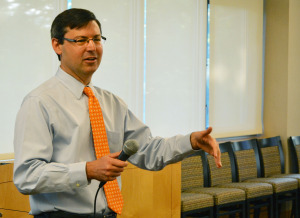After taking the reins in April as dean of Pace Law School in White Plains, David Yassky is bullish on the future of legal education.
“Law school and legal education remains highly valuable,” Yassky told the Business Journal, “There was a recent paper several months ago that the expected increase in lifetime earnings owing to a law degree is roughly a million dollars ”” over the course of a career ”” which I think is about right.”
Written by Michael Simkovic and Frank McIntyre and published in the Journal of Legal Studies in June, the paper Yassky cited posits that holders of a law degree can expect a 60 percent median increase in monthly earnings and a 50 percent median increase in hourly wages over the course of their careers.

Yassky realizes recent years haven”™t been kind to the perception of legal education, with former students suing New York Law School claiming they were misled about employment prospects (the students lost the suit), and a severe drop in legal employment due to the recent recession and a changing marketplace for legal services. The Wall Street Journal in October reported there were about 46,000 fewer jobs in the sector compared with peak levels in 2007, before the recession.
A law degree, he said, is “a material increase in earning power; it”™s not the tens of millions that some people thought it might be, but it”™s still a big number.”
And as the marketplace adapts to the new paradigms, Yassky, who earned a bachelor”™s degree at Princeton University and a law degree at Yale, believes that more jobs will be open to law school graduates who avail themselves of opportunities. And though those jobs may not be the traditional associate attorney position at a law firm, Yassky said he thinks they will be lucrative.
“There are a lot of jobs in addition to traditional law firm associate jobs, where legal skills and law school training are immensely valuable,” Yassky said. “Jobs like compliance at banks or pharmaceutical companies, jobs at big accounting firms that deal with corporate transactions or investigations, those are jobs that call for traditional legal skills even though they don”™t have ”˜lawyer”™ in the name of the job.”
Part of Yassky”™s challenge in leading Pace Law School will be to adapt the education that his students receive to the needs of the profession. When it comes to pedagogy, the perception is largely shaped by reality ”” that a professor stands at the front of the room, questioning students incisively on the meaning of the cases they were assigned to read.
“You teach yourselves the law, but I train your minds,” said professor Charles W. Kingsfield Jr., a character in the 1973 film “The Paper Chase,” depicting a student”™s first year at Harvard Law School. “You come in here with a skull full of mush; you leave thinking like a lawyer.”
Having previously taught constitutional law at Brooklyn Law School and New York University, Yassky said he believes there is still a place for such pedagogy.
“I actually remain a great fan of Kingsfield-style, Socratic-method law teaching,” Yassky said. “That”™s the foundation ”” the core foundation of a legal education is torts, contracts, property and those subjects taught in the traditional way. But we have to supplement it more by teaching how lawyers use those intellectual tools.”
Among those methods to teach law students the practice of law, rather than just the intellectual theory behind it, is to engage them in supervised practice experiences while they are still students. In his first year, Yassky has introduced two new supervised externship programs, one in family law and one in real estate practice.
“I would like to, five years from now, see that every PLS graduate has done a significant practice experience while in law school, that every Pace Law School graduate comes out with a set of skills that is suited to a particular job, be it a criminal defense laywer, real estate lawyer, family and matrimonial lawyer,” Yassky said.
The new dean said he believes legal education will weather the storm created by the recession.
“It”™s absolutely true that people got out of law school in 2010, 2011, were getting out of law school into the worst job market for lawyers, certainly, since the Depression,” Yassky said. “So that has had a deep impact on how people think about law school. The good news is we”™re coming out of that period, slowly but surely.”

















Comments 1